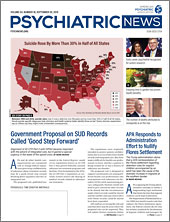Cannabidiol (CBD) may be helpful in reducing cravings and anxiety in people with heroin use disorder, suggests a study in AJP in Advance.
Yasmin L. Hurd, Ph.D., director of the Addiction Institute at Mount Sinai in New York, and colleagues randomly assigned 42 drug-free people with heroin use disorder to take 400 mg of CBD, 800 mg of CBD, or placebo once a day for three days. The majority of the participants—64.3%—had gone less than 30 days since the last time they used heroin or another opioid, and most had previously used intranasal heroin. None of the participants was taking medications to treat opioid use disorder.
Also, at three additional sessions, the participants were shown two videos: 60 minutes after taking their first dose of CBD or placebo, 24 hours after they took their first dose but before they took their second dose, and seven days after their final dose. One video showed relaxing scenarios such as scenes from nature. The other video showed intravenous or intranasal drug use. The researchers used standardized tools to measure the participants’ opioid cravings, anxiety, vital signs, and salivary cortisol levels (which indicate stress) several times during each session. The participants were also given questionnaires about cravings to complete at home.
The participants in the CBD groups experienced fewer cravings and less anxiety after watching the drug-related videos than those in the placebo group. At the first two sessions, those in the CBD groups also had lower cortisol levels and fewer symptoms of anxiety after watching the drug-related videos compared with those in the placebo group. At the final session, one week after their last dose, participants who had received 800 mg of CBD still had significantly less craving than those who received placebo. However, craving scores did not differ significantly between the 400 mg CBD group and the placebo group.
The researchers noted an important caveat to these findings: The participants’ responses to the take-home questionnaire suggest that CBD did not affect general craving. The researchers noted that environmental factors play a role in craving, and that general craving differs from craving triggered by cues such as seeing other people use drugs.
“General craving is craving that comes in the absence of [a specific trigger] or in the absence of stress or emotional upheaval that reminds the person of drug use. It’s the craving someone with an addiction can have that comes out of the blue without any provocation,” Hurd told Psychiatric News. “This is an important distinction from cue-induced craving because people with a heroin use disorder are particularly vulnerable to environmental cues that were previously associated with heroin use and can often still trigger drug craving.”
Although the study was not designed to measure outcomes such as a return to illicit opioid use, the researchers noted that during the course of the study, no one in the 800 mg group used opioids, one participant in the 400 mg group used heroin, and two participants in the placebo group used heroin.
Despite the promising results, Hurd cautioned that the findings are not a green light for using CBD to treat opioid use disorder.
“I don’t feel doctors should tell patients that it is completely OK to take it. We don’t have enough evidence. We have to use existing medications until large clinical trials show us the [potential CBD] dosage for treating opioid use disorder,” Hurd said.
Jill Williams, M.D., chair of APA’s Council on Addiction Psychiatry, agreed and said the findings should be interpreted in context.
“It’s a well-done study, with good methods. It’s clear what they looked at, and it’s impressive that CBD reduced cue-induced cravings,” said Williams, who was not involved in the research. “But the study is very preliminary. It’s also a pretty specific example in intranasal users and may not be generalizable to IV users. Participants had to be free of heroin … without taking medication for opioid use disorder. That’s a healthier sample and not representative of all patients with opioid use disorder.”
Hurd said that some patients will want to try CBD, regardless.
“I understand why patients who are afraid of overdosing on opioids might want to try it,” Hurd said. “When patients ask about it, it’s a great opportunity for physicians to speak openly with them and document that their patients may be using it, but not promote it. It’s an opportunity to gain observational information that can help guide their clinical care.”
Smita Das, M.D., Ph.D., M.P.H., a member of APA’s Council on Addiction Psychiatry, agreed.
“One thing I do see in practice is that patients with very good intentions seek quick treatments, be it for pain, anxiety, or sleep,” said Das, who was not involved in the research. “Whether it’s supplements or CBD, patients will take these products in the hope that they act very quickly, so it’s always important to ask about everything someone is taking.”
This study was supported in part by GW Pharmaceuticals and the Icahn School of Medicine at Mount Sinai. ■
“Cannabidiol for the Reduction of Cue-Induced Craving and Anxiety in Drug-Abstinent Individuals With Heroin Use Disorder: A Double-Blind Randomized Placebo-Controlled Trial” is posted
here.

